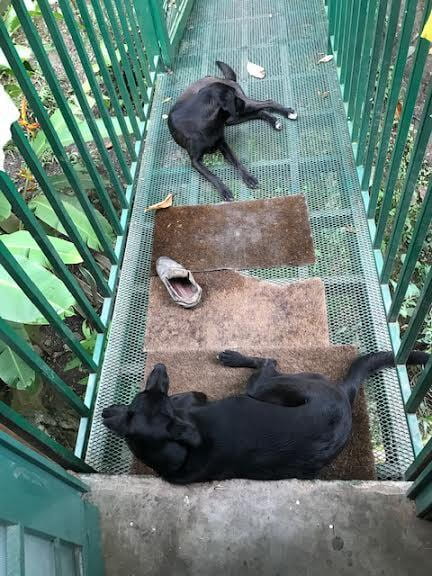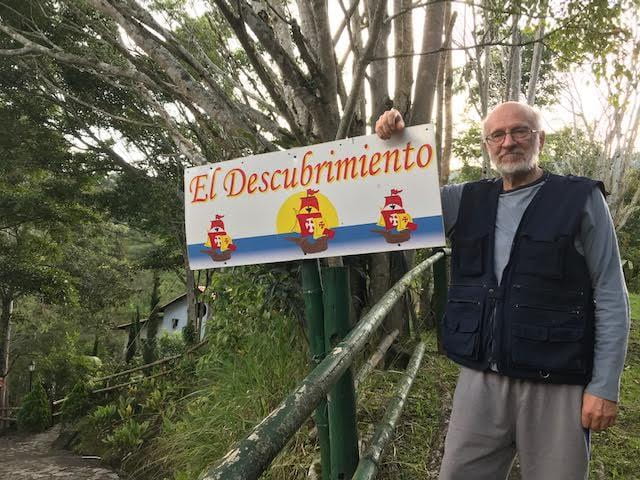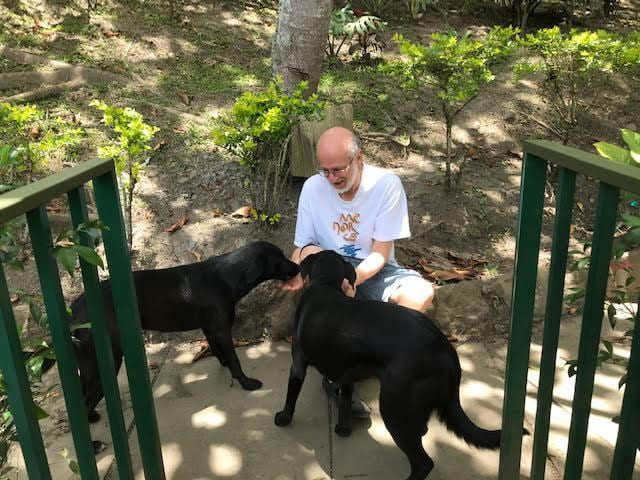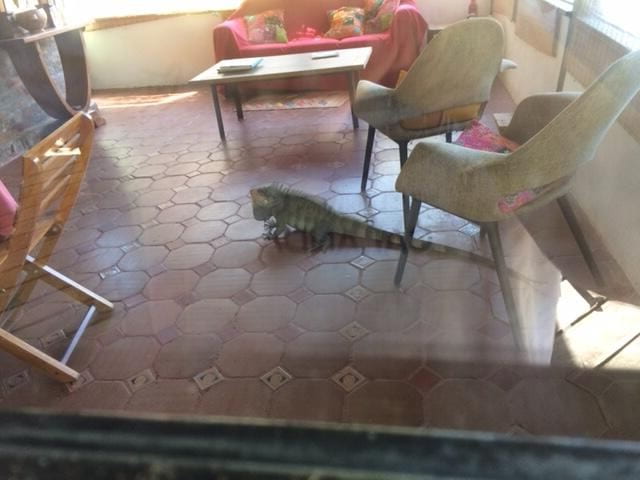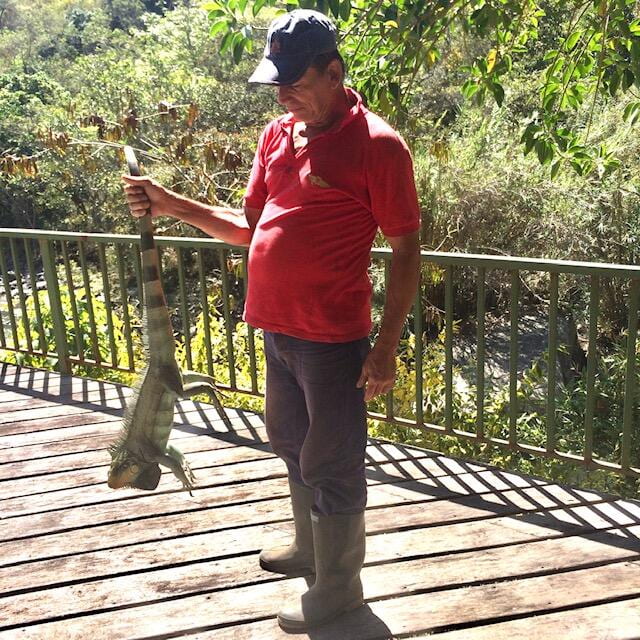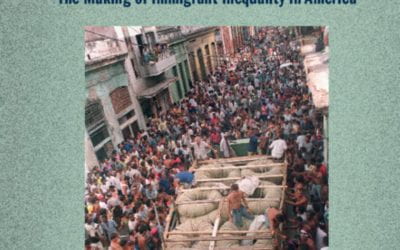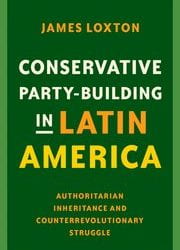Horror of Horrors!
Discovering Nature
—“Take them: here are the keys. For any problems, just call on Libardo, the caretaker.”
Those were the words of my cousin Alberto on that day when I asked if he could loan me his small house in the countryside to hole up with my wife, Pilar, during the pandemic. The keychain he gave me was a bit odd with its two decorations: the dried tail of a rabbit or some other creature and a plastic heart that read, “I Love NY.” I took the keys, thanked him for his generosity (especially considering that he thought the imminent threat of the coronavirus to be a “hoax,)” and we got ready to face the unexpected banishment recommended by our nature-loving friends. “You’re going to love being out in the country,” they told us. “You’ll discover the dazzling world of plants and animals, from butterflies to squirrels, and you’ll end up rediscovering yourselves in the process.”
The farm (we call it “finca” in Colombia), situated on the banks of a river in a lush green coffee-growing area, was—for some unfathomable coincidence— named “The Discovery.” With our car piled high with books and food, we took off from Bogotá along a highway bristling with perilous precipices. The house was very basic. It had electricity, but not always. It had television too—but only if there was electricity. The distance to the nearest civilized city (Bogotá) was three hours. Median temperature throughout the year: 72 degrees Fahrenheit. Size: what fashion magazines term with admirable elegance, “petite,” a small house on a small lot within a smallish rural subdivision. Large dogs, that indeed; two female dogs of the heteróclita colombiana breed, that is to say, a democratic mongrel.
Libardo, who in true Latin American style really had two first names, Libardo Rodrigo, greeted us with enthusiasm in his capacity of caretaker for the subdivision. The dogs were a recent gift from Libardo’s compadre and didn’t have names yet. We baptized them Pandemia and Corona and for six months they were our best friends and guides in the dreadful discovery of our terrifying tropical countryside.
The tropical countryside! It seems so marvelous on cable television shows, those where we watch the living room and bedroom of the bees, decipher the language of lizards through the movements of their tails and attend to the mating of zebras (no, they don’t have to take off their pajamas).
The editors of these videos manage to turn horror into glamour. Two hours after we’d installed ourselves in cousin Alberto’s petite house, the dogs brought us a gift. It was the sad cadaver of a squirrel—still warm. My wife opened the door and, terrified by the offering, cried out hysterically. I, the man of the house, ran to her aid and Libardo turned up on hearing both of us joined in unified screams of panic. With little delicacy, the caretaker yanked by the foot what had once been a sweet brown-back squirrel with a dark yellow chest. He proposed to put it in a plastic bag and stick it in the garbage. I protested. When I was a child, I often held solemn burials for my pets, so I was not disposed to inflict a barbaric end on the small animal. Libardo patiently dug a little grave, buried the squirrel in a most Christian way and covered the mound with some rocks.
“They,” he said, pointing to the dogs, who attended the funeral without a bit of shame, “are hunters, but they don’t eat what they catch. However, it’s best we keep them from digging up the remains to play with them.”
Nature had just given us our first lesson and I could only think I liked the opera better. The second lesson took place just a bit afterwards, when my wife was about to pick up an abandoned rope in the adjacent forest and the rope stretched itself out and began snaking. Which was not strange because it was a snake. We only saw one other serpent during the semester that our imitation of Walden lasted, but we always woke up with the fear that the dogs would bring us a snake as a present. Or a crocodile or a hippopotamus. With climate change, one never knows.
It would be unfair to say that we detested the countryside. No. We enjoyed many of its advantages: the sunsets (when it was not pouring so hard that we had to set out buckets to collect water from the leaks); the starlit skies (darkened by the flight of the shaggy bats known as chimbilás, disagreeable and oh so common to the region); the quiet murmur of the river (which turns into a threatening roar if it rains in the high part of the mountain range); the flowers, and in the manner of fruits, canned peaches and orange marmalade. It was precisely the oranges that lent themselves to this new discovery. In the rural subdivision, we had seen leafy orange and guava trees, but no fruits were hanging from their branches. When we asked Libardo about the absence of fruit, he responded with the rustic skepticism of his sixty years, “In this terrain, everything grows, but badly.”
He then showed us the ants that climb up the orange trees and the white worms that devoured the guava trees from the inside. His advice was to order our fruit from Bogotá. “All the best harvests in the country end up there and a trucker will bring all that you order right to the door.” No one had warned about this in the cable channels devoted to agriculture. I don’t even want to mention the gastronomic delicacies we saw on television and ended up hating while Pilar, poor thing, improvised recipes with eggs and all types of vegetables and grains: peppers, spinach, beans, corn, potatoes…By the way, don’t even think of trying to make an omelette with lettuce: the lettuce goes bad and so do the eggs.
- Pandemic discovers a picturesque tennis ball // Pandemia descubre una pintoresca pelota de tenis.
- Corona and the croc of the caretaker’s wife // Corona y un croc de la esposa del cuidandero.
The first scorpion we found in the kitchen scared us, but we examined it with strange curiosity. With astonishment, I’d say. If it hadn’t appeared dead, as indeed it was, perhaps we would have stampeded out in search of Libardo. In any case, we asked him to get the pest out of our sight. We never knew what the scorpion died from, but the other two we encountered lived until a second before receiving the heavy blow from my shoe, a technique in which I was trained by the caretaker. “Don’t kill the little spiders though because they are very useful,” he recommended. I don’t know at what point a “very useful” little spider gets to be a ferocious spider that aims at your neck, but my shoe does not discriminate among sizes. Four or five of these creatures perished with a mighty blow during these months.
Among the many discoveries –squirrels, spiders, worms, snakes, ants, scorpions— I confess that the most enchanting were the birds. My cousin had several books about tropical birds and we became avid fans of the sport of observing birds in ornithological treatises and then looking for them in flesh and blood in living nature. We had little luck. Except for the vultures, assiduous black angels of the sky, we only identified some canaries, several sparrows, two or three indigo buntings, a black-billed thrush or two, and innumerable and adorable hummingbirds. We watched the hummingbirds from afar because they are very elusive and they appeared to us to be about the size of a thumble. One morning, we got to find out that they are actually bigger because Pandemia, radiant with her adventure, presented us with a hummingbird trapped in her jaws.
This time we did not repeat the ritual we had carried out with the first pet and opted for the plastic bag and the garbage instead of burying the hummingbird in a Christian fashion. In a squirrelly fashion, I’d say . The same lack of funeral rites awaited all the other fellow creatures offered up by the dogs. Nature began to collect its lessons: the survival of the fittest, Darwinism, the laws of life and death… We were becoming hardened, like the bread that the good Libardo sometimes brought us.
The Internet opened new horizons for us. My wife discovered that, instead of hating insects for damaging the orange and guava trees, it was possible to admire them from a scientific lens. At night, when the Internet connection was strongest, if the incessant sound of scarab beetles left us in peace, we would embark on unforgettable adventures through the motley world of entomology. We discovered that, quite opposite to what happens in politics, many horrible wormy caterpillars in time turn into beautiful butterflies. We learned that the Vanessa cardui (not to be confused with the Italian actress with a similar name) only lives 12 months; that the detachable wings of the Papilio machao measure three- and-a-half inches, while the wingspan ot the Pieris rapae is less than an inch. We also learned that these facts were useless because we were incapable of identifying these bugs out in nature: no caterpillar, no butterfly, sports on its chest those nametags North Americans wear in their gatherings and provide, at the very least a person’s first name: Peter, June… Papilio, Pieris…
Pandemia and Corona accompanied us more and more intensely and it must be recognized that the six months of confinement in horrible nature was more palatable because of them. We got used to their gifts. One day, they left a beaten-up hat at our doorstep. The other day (memorable for the horror it produced), the cadaver of an enormous rat we learned was an opposum. One morning, we were surprised by a nibbled shoe, but even more surprised when Libardo’s wife came to claim the shoe, which the dogs had taken the evening before. I will never forget August 7, National Independence Day, when they contributed a multi-colored tennis ball. My wife believed she saw the colors of the fatherland in the ball, and I believed that I saw in my wife the typical person affected seriously by the long confinement.
The end came one noon when, going into the dining room, my wife stumbled on an iguana the size of Pandemia or Corona. Libardo heard her shriek and came immediately. No one had ever seen an iguana in this region. No one knew where it came from or where it was going. We only knew that, with tremendous courage, Libardo grabbed it by the tail and hurled it into the river just a few minutes before we gathered up our clothes, suitcases and books in the car and left at full speed towards the city, its fascinating asphalt and comforting tall buildings. We had had a sufficient dosis of nature. Too much, I’d say.
Descubriendo la naturaleza: todo un horror!
Por Daniel Samper Pizano
—“Toma: aquí tienes las llaves. Cualquier dificultad te la soluciona Libardo, el cuidandero”.
Así dijo mi primo Alberto aquel día en que le pedí prestada su pequeña casa de campo para refugiarme con mi mujer durante la pandemia. Era un curioso llavero del que colgaban dos adornos: uno era una cola disecada de conejo, o algún animal parecido, y otro, un corazón de plástico que decía I Love NY. Recibí el llavero, agradecí la generosidad de mi primo, quien consideraba “una patraña” aquello de la inminente epidemia de coronavirus, y nos dispusimos a afrontar el inesperado destierro aconsejados por amantes de la naturaleza. “Van a disfrutar del campo”, nos dijeron, “Van a descubrir un mundo deslumbrante de plantas y animales, desde mariposas hasta ardillas, y terminarán redescubriéndose ustedes mismos”.
La finca, por insondable coincidencia, se llama El Descubrimiento y está situada a orillas de un río en una vereda verde donde se cultiva café. Con el carro repleto de libros y comida partimos por una carretera erizada de abismos. La casa era precaria. Tenía luz eléctrica: sí, pero no siempre. televisión: solo si había luz. Distancia de la ciudad más civilizada (Bogotá): tres horas. Temperatura media durante el año: 22 grados centígrados. Tamaño: lo que con admirable elegancia llaman las revistas de moda petite: casa pequeña en lote pequeño dentro de una parcelación rural reducida. Perros grandes, eso sí; dos hembras negras de raza heteróclita colombiana, es decir, un democrático mestizaje canino. Nos recibieron alegremente al lado de Libardo, el encargado de velar por la parcelación, que en realidad se llama Libardo Rodrigo: doble onomástico, como buen latinoamericano. Las perras eran el regalo reciente de un compadre del cuidandero y carecían aún de nombre. Las bautizamos Pandemia y Corona y durante seis meses fueron nuestras mejores amigas y nuestras guías en el pavoroso descubrimiento del agreste campo tropical.
¡El campo tropical! Parece maravilloso en los canales de televisión especializados, aquellos donde vemos la sala y el dormitorio de las abejas, desciframos lenguaje de los lagartos con el movimiento de la cola y asistimos el apareamiento de las cebras sin necesidad de que se quiten las piyamas. Algo hacen los editores de estos videos que vuelven glamouroso el horror. Dos horas después de habernos instalado en la casa petite del primo Alberto las perras nos llevaron un regalo de bienvenida. Era el triste cadáver de una ardilla, todavía tibio. Mi mujer abrió la puerta y, aterrada por el obsequio, lanzó un grito histérico. Yo, el hombre del hogar, corrí en su ayuda y Libardo acudió al oír nuestros dos unísonos berridos de pánico. Con poca delicadeza, el encargado agarró por una pata lo que había sido una tierna ardilla de lomo marrón y pecho ocre y se proponía meterla en una bolsa de plástico y añadirla a la basura cuando protesté. De niño solía hacerles entierros solemnes a las mascotas, así que no estaba dispuesto a propinar un final bárbaro al animalito. Libardo excavó con toda paciencia una pequeña fosa, sepultó cristianamente a la ardilla y cubrió el túmulo con unas piedras.
“Ellas”—dijo señalando a las perras, que asistían poco acongojadas a las honras fúnebres—, “son cazadoras, pero no comen lo que cazan. Sin embargo, es bueno impedir que saquen los restos para jugar con ellos”.
La naturaleza acababa de darnos una primera lección y pensé que me gustaba más la ópera. La segunda se produjo poco después, cuando mi mujer estuvo a punto de recoger un cordón tendido en el sendero del bosque vecino y el cordón se estremeció y huyó culebreando. Cosa que no era de extrañar pues se trataba de una culebra. Solo vimos otra serpiente durante el semestre que duró nuestra imitación de Walden, pero siempre amanecíamos con el temor de que las perras nos llevaran alguna como presente. O un caimán o un hipopótamo. Con los cambios ambientales nunca se sabe.
Sería injusto decir que aborrecimos el campo. No. Disfrutamos muchas de sus ventajas: los atardeceres (cuando no estaba diluviando y era preciso poner tazas para recoger las goteras); los cielos estrellados (ensombrecidos por el vuelo de los chimbilás, los desagradables murciélagos de la región); el rumor del río (que se volvía rugido amenazante si llovía en la parte alta de la codillera); las flores y, en materia de frutas, los melocotones enlatados y la mermelada de naranja. Justamente fueron las naranjas las propiciadoras de un nuevo descubrimiento. Habíamos visto en la parcelación frondosos naranjales y guayabos, pero no colgaban frutas de sus ramas. Cuando le preguntamos a Libardo por el hecho, nos respondió desde el rústico escepticismo de sus sesenta años:
“En esta tierra todo se da, pero mal”.
Y nos mostró enseguida las hormigas que trepaban por los naranjos y los gusanos blancos que devoraban por dentro las guayabas. Su consejo fue encargar las frutas a Bogotá: “Allá llevan las mejores cosechas del país y hay un camionero que trae lo que uno le pida”. Nada de esto nos habían advertido en los canales dedicados a la agricultura. No quiero mencionar las delicias gastronómicas que veíamos en la televisión y que terminamos por odiar, mientras mi mujer, pobrecita, improvisaba recetas con huevos y toda clase de verduras y hortalizas: pimientos, espinacas, judías, maíz, papas…. Por cierto: no ensayen la tortilla de lechuga: pierden la lechuga y pierden los huevos.
- Pandemic discovers a picturesque tennis ball // Pandemia descubre una pintoresca pelota de tenis.
- Corona and the croc of the caretaker’s wife // Corona y un croc de la esposa del cuidandero.
El primer alacrán que encontramos en la cocina nos produjo miedo, pero lo examinamos con rara curiosidad. Con asombro, diría yo. Si no hubiera aparecido muerto, como estaba, quizás habríamos salido en desbandada en pos de Libardo. De todos modos, le pedimos al cuidandero que retirara la alimaña de nuestra vista. Nunca supimos de qué murió, pero los otros dos que hallamos vivieron hasta un segundo antes de recibir zapatazo en el que me entrenó el guardés. “A las arañitas no las maten que son muy útiles”, recomendó también. No sé en qué punto una arañita “muy útil” pasa a ser araña feroz que se te lanza al cuello, pero mi zapato no discriminó tallas. Cuatro o cinco perecieron bajo su golpe imperial durante esos meses.
Entre los muchos descubrimientos –ardillas, arañas, gusanos, culebras, hormigas, alacranes— confieso que el más encantador fueron los pájaros. Mi primo tenía varios libros sobre aves tropicales y nos aficionamos al deporte de observar pájaros en tratados ornitológicos y después buscar los mismos ejemplares de carne y pluma en la naturaleza viva. Tuvimos poco éxito. Salvo los buitres, asiduos ángeles negros de los cielos, no divisamos más que unos cuantos canarios, varios gorriones, dos o tres azulejos, alguna mirla y numerosos y adorables colibríes. A estos los mirábamos desde lejos, pues son muy esquivos, y nos parecían del tamaño de un dedal. Una mañana pudimos saber que son algo más grandes debido a que Pandemia se presentó radiante con un desventurado colibrí en las fauces. Esta vez no repetimos el ritual que habíamos observado con la primera mascota y optamos por la bolsa plástica y la basura en vez de sepultar al colibrí cristianamente. Ardillamente, diría yo. El mismo vacío funeral esperaba a los demás congéneres que aportaron las perras. La naturaleza empezaba a recoger sus enseñanzas: la supervivencia de los más fuertes, el darwinismo, las leyes de la vida y de la muerte… Nos estábamos endureciendo, como el pan que a veces nos traía el bueno de Libardo.
Internet nos abrió nuevas ventanas. Mi mujer descubrió que, en vez de odiar los insectos por deteriorar las naranjas y las guayabas, era posible admirarlos desde una óptica científica. De noche, cuando mejor entraba la señal de internet, si los cucarrones nos dejaban tranquilos emprendíamos inolvidables aventuras por el abigarrado mundo de la entomología. Descubrimos que, al revés de la política, muchos gusanos horribles se convierten con el tiempo en bellas mariposas. Supimos que la Vanessa cardui (no confundir con una actriz italiana de nombre parecido) solo vive doce meses; que las alas desplegadas de la Papilio machao miden casi nueve centímetros y que, en cambio, la envergadura de las de Pieris rapae es apenas de 3.2 centímetros. También supimos que de poco nos servían estos datos pues éramos incapaces de identificar los bichos en vivo y en directo: ninguna oruga, ninguna mariposa llevan en el pecho esos botones que exhiben los norteamericanos en sus reuniones y que ofrecen, por lo menos, su nombre de pila: Peter, June… Papilio, Pieris…
Pandemia y Corona nos acompañaban de manera cada vez más intensa, y conviene reconocer que los seis meses de encierro en medio de la atroz naturaleza se hicieron más leves merced a ellas. Nos acostumbramos a sus regalos. Un día dejaban en la puerta un sombrero raído. Otro día (memorable por el horror que produjo), el cadáver de una rata enorme conocida como fara. Nos sorprendió hallar una mañana en el portal un zapato mordisqueado, pero más nos sorprendió que lo reclamara la mujer de Libardo, a quien se lo habían hurtado la víspera. No olvidaré nunca el 7 de agosto, día de la Independencia Nacional, cuando aportaron una pelota de tenis multicolor. Mi mujer creyó ver en ella los colores de la patria y yo creí ver en mi mujer a la típica persona afectada seriamente por el encierro.
Daniel Samper Pizano was the first Latin American to become a Nieman Fellow (1980-1981) at Harvard. He worked for El Tiempo (Colombia) and Cambio 16 (Spain) and has lived in both counteis. He is the recipient of the Maria Moors Cabot, King of Spain and Simón Bolívar Awards, among others. Samper is author of more than 35 book and is a member of the Royal Academy of the Spanish Language. He is a columnist for the website losdanieles.com, one of the most influential in Colombia.
Daniel Samper Pizano fue el primer latinoamericano que ingresó al programa Nieman Fellows (1980-1981) en Harvard. Trabajó en El Tiempo (Colombia) y Cambio 16 (España) y ha vivido en los dos países. Es ganador, entre otros, de los premios Maria Moors Cabot, Rey de España y Simón Bolívar. Samper es autor de más de 35 libros y miembro de la Academia de la Lengua. Es columnista del portal losdanieles.com, uno de los más influyentes de Colombia.
Related Articles
A Review of Cuban Privilege: the Making of Immigrant Inequality in America by Susan Eckstein
If anyone had any doubts that Cubans were treated exceptionally well by the United States immigration and welfare authorities, relative to other immigrant groups and even relative to …
A Review of Conservative Party-Building in Latin America: Authoritarian Inheritance and Counterrevolutionary Struggle
James Loxton’s Conservative Party-Building in Latin America: Authoritarian Inheritance and Counterrevolutionary Struggle makes very important, original contributions to the study of…
Endnote – Eyes on COVID-19
Endnote A Continuing SagaIt’s not over yet. Covid (we’ll drop the -19 going forward) is still causing deaths and serious illness in Latin America and the Caribbean, as elsewhere. One out of every four Covid deaths in the world has taken place in Latin America,...

